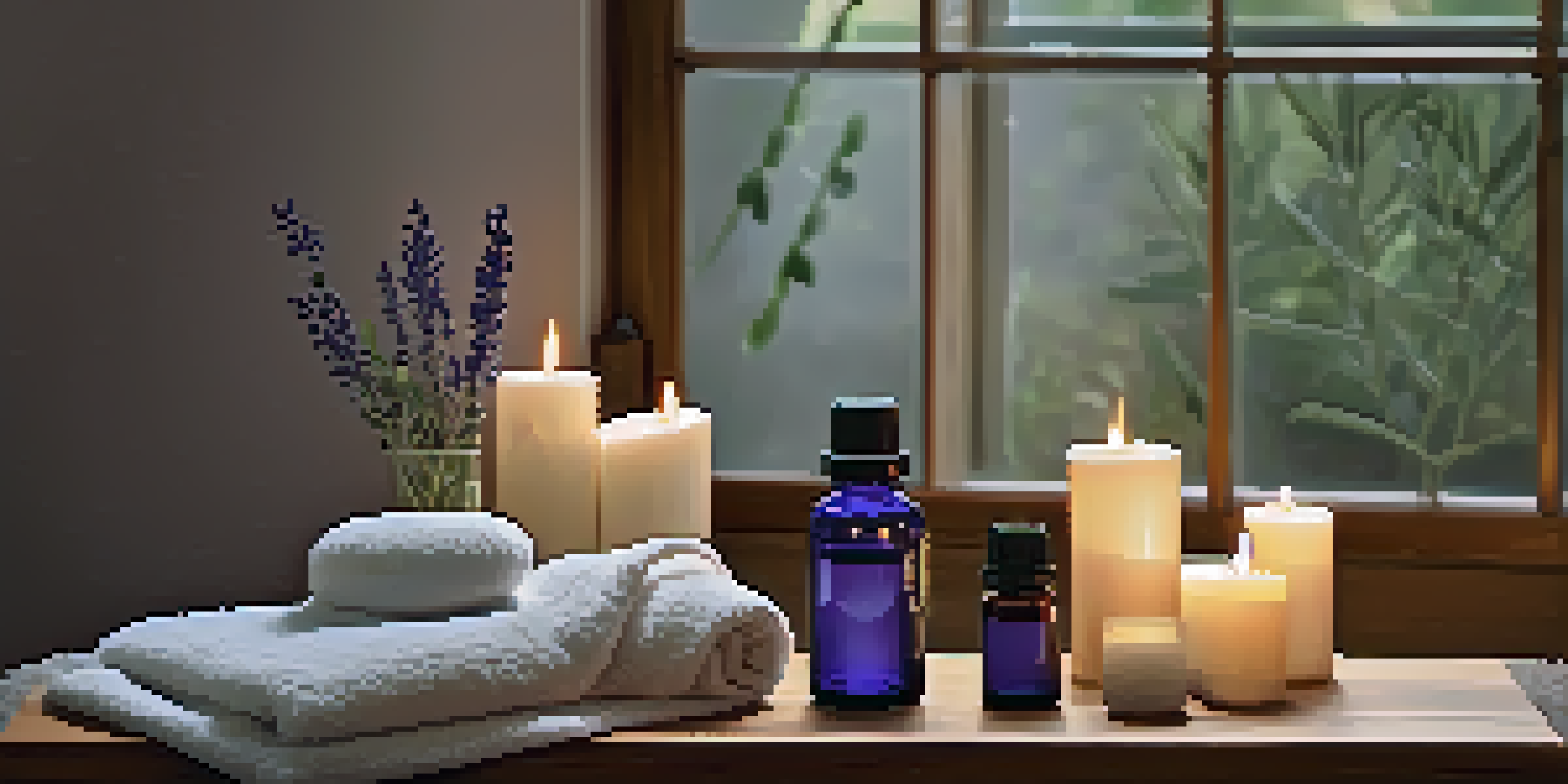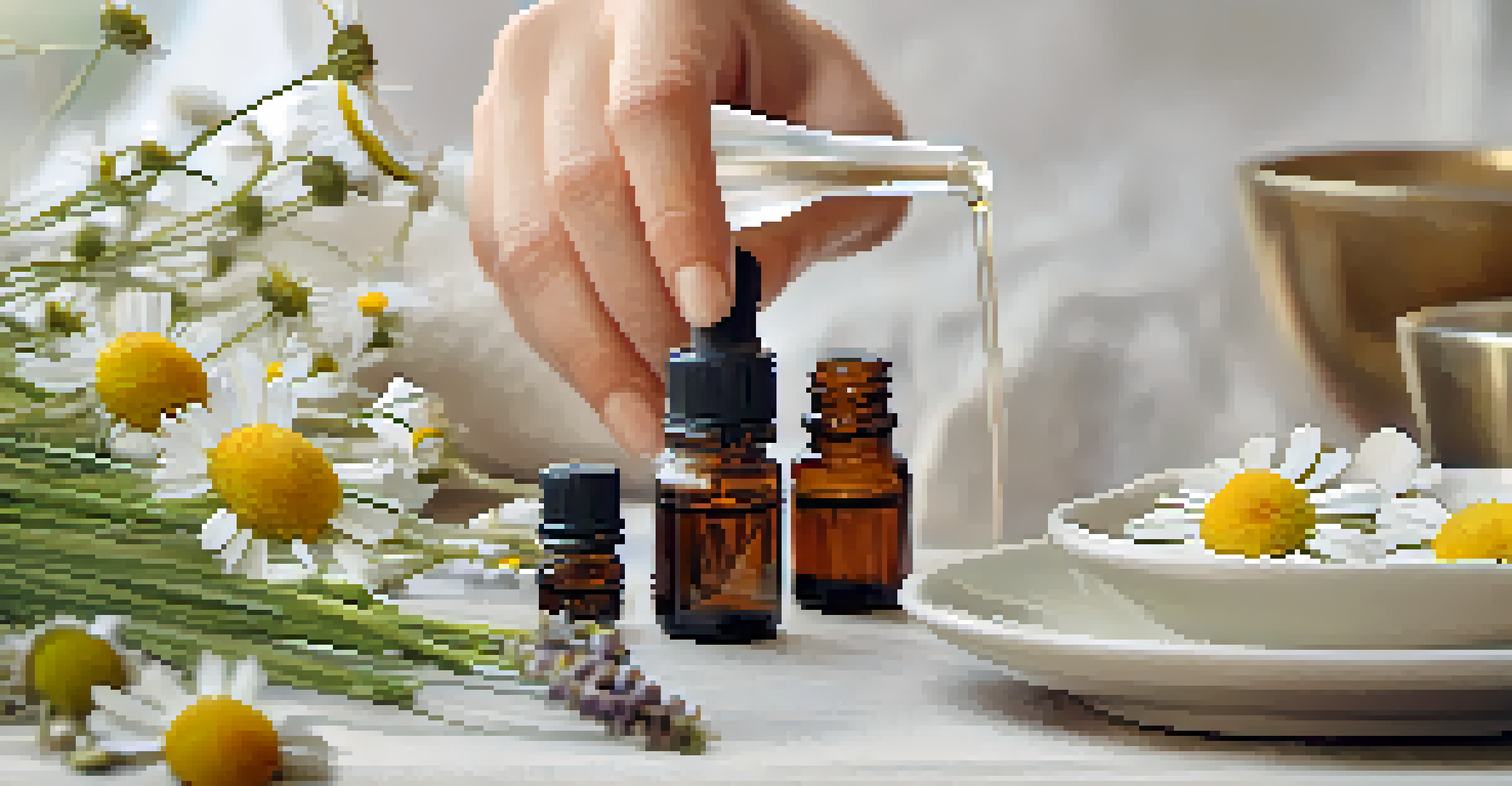The Role of Aromatherapy in Spa Experiences and Retreats

Understanding Aromatherapy and Its Benefits
Aromatherapy is a holistic healing practice that uses essential oils extracted from plants to promote physical and emotional well-being. By inhaling these oils or applying them to the skin, individuals can experience various benefits, such as reduced stress, improved mood, and enhanced relaxation. The practice has roots in ancient cultures, where it was used for medicinal and spiritual purposes, making it a timeless addition to modern wellness routines.
The nose is a potent wizard that transports you across thousands of miles and all the years you have lived.
In the context of spa experiences, aromatherapy plays a crucial role in creating an inviting atmosphere. The right scents can transport guests to serene environments, helping them disconnect from the hustle and bustle of daily life. For instance, lavender is often used for its calming properties, while citrus scents like orange can uplift and energize, making the selection of essential oils a key component in setting the mood for relaxation.
Moreover, aromatherapy can enhance physical treatments. When combined with massages or facials, the use of essential oils can improve circulation, reduce muscle tension, and promote healthier skin. This synergy between aromatherapy and spa treatments not only amplifies the overall experience but also fosters a deeper state of relaxation and rejuvenation.
Creating a Relaxing Atmosphere with Scent
The ambiance of a spa is vital for a truly immersive experience, and scent plays a pivotal role in establishing this atmosphere. When guests enter a spa, the first thing they often notice is the fragrance in the air, which can instantly influence their mood and expectations. Incorporating a well-thought-out selection of essential oils helps create a unique sensory experience that aligns with the spa's theme and services.

For example, a spa focused on detoxification may use eucalyptus and peppermint to invigorate the senses and promote clarity. On the other hand, a retreat designed for deep relaxation might opt for sandalwood or chamomile to help guests unwind. This thoughtful pairing of scents with spa offerings not only enhances client satisfaction but also adds a personal touch that guests appreciate.
Aromatherapy Enhances Well-Being
Aromatherapy uses essential oils to promote physical and emotional health, providing benefits like reduced stress and improved mood.
Additionally, the use of diffusers and scented candles can further elevate the experience. These tools release essential oils gradually, ensuring that the aroma is not overpowering but rather a gentle, soothing background presence. This subtle infusion of scent can help guests feel more at ease, allowing them to fully embrace the tranquility of their surroundings.
Popular Essential Oils for Spa Treatments
Certain essential oils have gained popularity in spa settings due to their unique properties and benefits. Lavender, for instance, is revered for its calming effects, making it a staple in relaxation massages and stress relief treatments. By integrating such oils into their services, spas can offer clients powerful tools for emotional and mental well-being.
Aromatherapy is a bridge between the body and the spirit, a way to heal the body and elevate the spirit.
Another favorite is tea tree oil, which boasts antiseptic and anti-inflammatory qualities. This makes it an excellent choice for facials and skincare treatments, particularly for those struggling with acne or skin irritations. By selecting oils that align with specific treatment goals, spas can provide personalized experiences that cater to the individual needs of their guests.
Moreover, citrus oils like lemon and bergamot are often used to uplift and refresh. Their bright scents can energize clients, making them ideal for pre-treatment rituals or post-treatment pick-me-ups. By combining various essential oils, spas can create signature blends that enhance their unique brand identity and provide memorable experiences.
Integrating Aromatherapy into Spa Treatments
Integrating aromatherapy into spa treatments can be as simple as adding a few drops of essential oil to massage oils or lotions. Therapists can customize their approach based on client preferences and specific treatment goals, ensuring a more personalized experience. This flexibility allows for a dynamic treatment that evolves with the client's needs, enhancing overall satisfaction.
In addition to massages, aromatherapy can be incorporated into facials, body scrubs, and wraps. For instance, a facial treatment could include a soothing lavender-infused steam, while a body scrub might feature invigorating peppermint to awaken the senses. These thoughtful integrations can transform standard treatments into holistic experiences that nurture both body and mind.
Scents Create a Relaxing Atmosphere
The right selection of essential oils can establish a calming environment in spas, making the guest experience more enjoyable.
Furthermore, spas can offer guided aromatherapy sessions where clients learn about the different essential oils and their benefits. This interactive element not only educates guests but also empowers them to make informed choices about their wellness journey. By fostering a deeper understanding of aromatherapy, spas can enhance client loyalty and encourage repeat visits.
The Psychological Benefits of Aromatherapy
Aromatherapy is not just about pleasant scents; it also has profound psychological effects that can enhance the overall spa experience. Scents can trigger memories and emotions, creating a powerful connection between fragrance and feelings of relaxation or happiness. This emotional response can significantly contribute to the client's overall sense of well-being during their spa visit.
For instance, a familiar scent from childhood, like chamomile, might evoke feelings of comfort and safety, allowing guests to relax more deeply. This connection underscores the importance of carefully selecting scents that resonate with clients on a personal level. By understanding the psychological aspects of scent, spas can create tailored experiences that speak to the heart of their guests.
Additionally, studies have shown that certain scents can reduce anxiety and promote better sleep. By incorporating these aromas into treatments, spas can help clients leave not only with a sense of relaxation but also equipped with tools to manage stress in their daily lives. This dual benefit underscores why aromatherapy is such an integral part of the spa experience.
Aromatherapy in Spa Retreats: A Holistic Approach
Spa retreats are designed to provide an immersive experience focused on rejuvenation and self-care, and aromatherapy fits seamlessly into this holistic approach. By integrating essential oils into daily activities, such as yoga sessions and meditation, retreats can create a cohesive environment that promotes tranquility and mindfulness. This alignment reinforces the retreat's overall goals of healing and well-being.
For instance, a retreat might incorporate essential oils into guided meditation practices, allowing participants to fully engage their senses and deepen their relaxation. Scents like frankincense and myrrh can enhance spiritual connection, helping guests to feel more present and grounded. This aspect of aromatherapy adds a layer of depth to the retreat experience, making it more transformative.
Personalized Treatments Boost Satisfaction
Integrating aromatherapy into various spa services allows for customized experiences that cater to individual client needs and preferences.
Moreover, the incorporation of aromatherapy into meals and beverages can further enhance the retreat experience. Herbal teas infused with chamomile or lavender can promote relaxation, while citrus-infused water can invigorate and refresh. By weaving aromatherapy throughout the retreat, guests can enjoy a truly holistic experience that nurtures their body, mind, and spirit.
Choosing the Right Spa for Aromatherapy Experiences
When selecting a spa that prioritizes aromatherapy, it's essential to consider the variety of essential oils and treatments offered. Look for establishments that provide customizable options, allowing you to choose scents that resonate with your personal preferences and wellness goals. A spa that emphasizes aromatherapy in its branding and offerings is likely to provide a more enriching experience.
Additionally, reading reviews and seeking recommendations can help identify spas that excel in aromatherapy treatments. Clients often share their experiences regarding the effectiveness of the oils used and the ambiance created by the scents. This feedback can guide you toward a spa that aligns with your expectations and enhances your overall experience.

Lastly, don't hesitate to inquire about the spa's approach to aromatherapy during your visit. Understanding their philosophy and how they integrate essential oils into treatments can provide valuable insight. This conversation can help you feel more confident in your choice, ensuring that your spa experience is both enjoyable and rejuvenating.